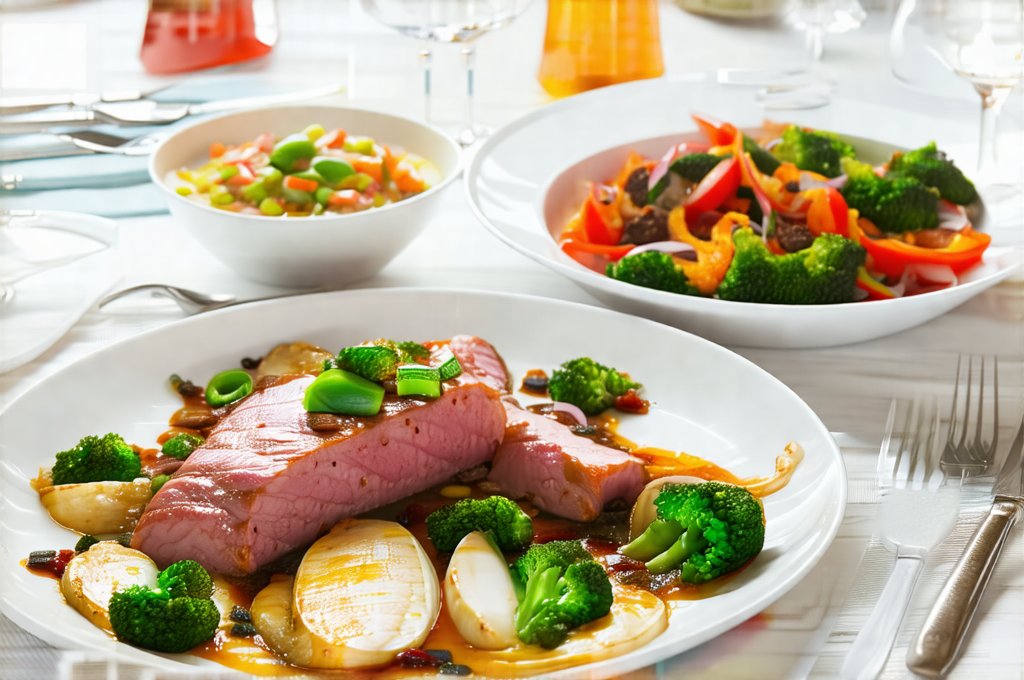The relationship between what we eat at dinner and how well we sleep is often underestimated. Many people experience disrupted sleep due to digestive discomfort, bloating, or simply feeling overly full before bed. This can lead to restless nights, impacting our energy levels and overall wellbeing. Choosing the right foods for your evening meal isn’t about strict dieting; it’s about making informed choices that support your body’s natural processes and promote restful sleep. A heavy, rich, or difficult-to-digest dinner forces your digestive system to work overtime while you attempt to rest, potentially leading to poor sleep quality.
The key lies in understanding how different foods are processed by the body. Easily digestible meals minimize strain on the digestive system, allowing it to ‘rest’ alongside us during sleep. This also means avoiding ingredients that can cause gas or bloating, and limiting stimulants like caffeine and excessive sugar close to bedtime. Focusing on lean proteins, complex carbohydrates, healthy fats in moderation, and soothing herbal teas can significantly improve your chances of a peaceful night. It’s about creating a harmonious connection between dinner choices and sleep architecture – ensuring both fuel the body and encourage restorative rest. If you’re struggling with this, consider how to build trust as a starting point.
The Science Behind Digestibility & Sleep
Digestion is an active process that requires energy expenditure from the body. When we eat a large or complex meal close to bedtime, our digestive system remains highly engaged throughout the night. This can interfere with the natural transition into deeper stages of sleep and may even trigger wake-ups due to discomfort. The vagus nerve, which connects the gut to the brain, plays a crucial role in this process. When the gut is working hard, signals are sent to the brain, potentially increasing arousal and reducing melatonin production – the hormone essential for sleep.
Furthermore, certain foods are inherently more difficult to digest than others. High-fat foods, for example, take longer to break down, requiring more digestive effort. Spicy foods can cause heartburn or acid reflux, disrupting sleep. And excessive amounts of fiber, while generally healthy, can lead to gas and bloating if consumed too close to bedtime. The goal isn’t to eliminate these foods entirely – but rather to strategically time their consumption for earlier in the day when your body has ample time to process them. Understanding are you eating the right amount can also help manage this.
Ultimately, prioritizing easily digestible foods at dinner helps minimize digestive stress and allows the body to focus on repair and restoration during sleep. This translates into improved sleep quality, increased energy levels, and a greater sense of wellbeing. The timing of your meal is also important; aim to finish eating at least 2-3 hours before bedtime to give your system time to work its magic.
Building an Easy-to-Digest Dinner Plate
Constructing an easy-to-digest dinner plate starts with mindful ingredient selection and portion control. The foundation should be lean protein, complex carbohydrates, and healthy fats in moderation. Lean proteins like fish (salmon, cod), poultry (chicken breast, turkey), or tofu are easier to digest than red meat or processed meats. Complex carbohydrates – think sweet potatoes, quinoa, brown rice – provide sustained energy without causing a rapid blood sugar spike that can disrupt sleep.
Healthy fats, such as avocado, olive oil, or nuts and seeds (in small amounts), offer essential nutrients but should be consumed in moderation to avoid overwhelming the digestive system. Vegetables are also crucial; steamed or lightly roasted options like broccoli, spinach, or carrots are easily digestible and provide vital vitamins and minerals. Avoid fried foods, excessive dairy, and highly processed ingredients which can contribute to bloating and discomfort.
- Focus on portion sizes: Overeating is a common cause of sleep disruption.
- Hydrate with water instead of sugary drinks before bed.
- Consider incorporating calming herbs like chamomile or lavender into your meal (e.g., a sprinkle in roasted vegetables). It may be useful to explore creating rituals around mealtimes for added support.
Soothing Soup Recipes for Sleep
Soups are often an excellent choice for an easy-to-digest dinner, as they’re hydrating and generally gentle on the stomach. They can be customized to include lean proteins, complex carbohydrates, and soothing vegetables. Chicken noodle soup, made with bone broth, is a classic example – the collagen in bone broth may even promote gut health. Consider these variations:
- Ginger Carrot Soup: Carrots are easily digestible and ginger has anti-inflammatory properties that can soothe the digestive system. Blend steamed carrots with vegetable broth, grated ginger, and a touch of coconut milk for a creamy, comforting soup.
- Miso Soup with Tofu & Spinach: Miso is fermented soybean paste containing probiotics, which support gut health. Combine miso paste with dashi (Japanese broth), silken tofu, spinach, and a sprinkle of seaweed flakes.
- Butternut Squash Soup: This creamy soup offers beta-carotene and fiber without being overly heavy. Roast butternut squash until tender, then blend with vegetable broth, cinnamon, and nutmeg for a warming and comforting meal.
Remember to avoid adding excessive cream or spices that could potentially cause digestive upset. Keep the seasoning light and focus on natural flavors. Consider sleep and digestion when choosing ingredients.
The Power of Fish & Quinoa
Combining fish with quinoa is a fantastic way to create an incredibly digestible and nutrient-rich dinner. Fish, particularly white fish like cod or halibut, are lean sources of protein and omega-3 fatty acids, which have been linked to improved sleep quality. Quinoa is a complete protein source that’s also rich in magnesium – another mineral known for its calming effects on the nervous system.
Preparing this meal is simple: bake or steam the fish, cook quinoa according to package directions (rinsing it beforehand helps with digestibility), and pair it with steamed vegetables like asparagus or green beans. A drizzle of olive oil and a squeeze of lemon juice add flavor without being overly heavy. This combination provides sustained energy without causing digestive discomfort.
- Avoid frying the fish; baking, steaming, or poaching are preferable methods.
- Add a side of chamomile tea to further enhance relaxation before bedtime.
- Experiment with different herbs and spices (dill, parsley) to customize the flavor profile.
Gentle Breakfast-For-Dinner Options
Sometimes, shifting your mindset can lead to surprisingly effective dinner solutions. “Breakfast for dinner” isn’t about indulging in sugary cereals – it’s about leveraging the naturally easy-to-digest qualities of breakfast foods. Oatmeal, for example, is a great source of fiber and melatonin precursors (tryptophan), promoting relaxation and sleep. Eggs are also a good option; they provide protein without being overly heavy.
Consider these gentle options:
1. Oatmeal with Berries & Almond Butter: Use rolled oats and avoid instant oatmeal which often contains added sugar. Top with antioxidant-rich berries and a small spoonful of almond butter for healthy fats.
2. Scrambled Eggs with Spinach & Whole Wheat Toast: A classic breakfast that’s quick, easy to digest, and provides protein and essential nutrients.
3. Greek Yogurt with Honey & Banana: Greek yogurt is high in protein and probiotics; a drizzle of honey and slices of banana add natural sweetness and potassium – another mineral associated with relaxation.
These options are typically lighter than traditional dinners, reducing digestive strain and promoting a sense of calm before bed. They also offer a refreshing change from heavier meals and can be a fun way to incorporate more variety into your diet. If you have children, simple dinner ideas can make things easier for the whole family! And remember that morning beverages can set a positive tone for digestive health all day long.


















